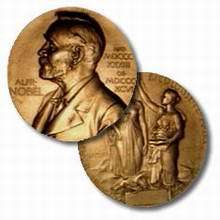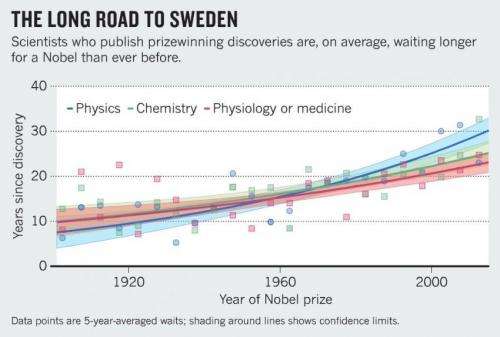April 10, 2014 report
Professor notes wait for Nobel science prizes is growing alarming long

(Phys.org) —Santo Fortunato, Associate Professor of Complex Systems at Aalto University in Espoo, Finland has published a Correspondence piece in the journal Nature, outlining what he describes as an increasing time lag between notable work accomplished by scientists and the awarding of a Nobel Prize for what they've achieved.
Fortunato points out that since the creation of the awards (established in 1895, first awarded in 1901) those who win the award have had to wait longer and longer on average to receive it. Prior to 1940, for example, just 20 percent of recipients for work in physics had to wait 20 years or more, 15 percent for chemistry and 24 percent for those working in the physiology or medicine fields. In contrast, since 1985, those percentages have grown to 60, 52 and 45 percent. At the rate we're going, he notes dryly, there will come a day sometime soon when no one will be able to win any of the awards because they would have all died already—prizes are not granted posthumously.
No one really knows why the wait for receiving a prize has grown so long. Some suggest it's because the committees that grant them find more modern work less ground-breaking and thus keep going back in time to find something they see as worthy. Others suggest the opposite is true, that the glut of breakthroughs creates a backlog, forcing committee members to choose people who deserve the award before they grow old and die (similar to the problem found with many sports organizations as induction into various Halls of Fame tend to skew towards older and older players.) In this case, the problem would be that so few people are awarded each year.

Of course another explanation for the time lag might be the nature of scientific discoveries in general—as we learn more it takes more time for new discoveries to prove themselves. On the other hand it could be that committee members feel more comfortable giving awards to people who have maintained strong reputations throughout their career—to avoid embarrassment should a blemish show up on their record after their groundbreaking work.
In any case, Fortunato notes that the trend is increasing across all disciplines, and that there is one example already of what he calls the extinction of laureates—Robert Brout who would have been on the stage with François Englert and Peter Higgs last year when they received a shared Physics award for the discovery of the Higgs boson—he'd passed away at the age of 82, two years earlier.
More information: Prizes: Growing time lag threatens Nobels, Nature 508, 186 (10 April 2014) DOI: 10.1038/508186a
Journal information: Nature
© 2014 Phys.org



















